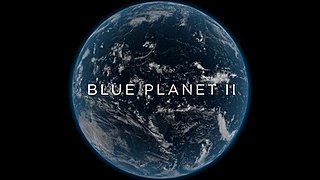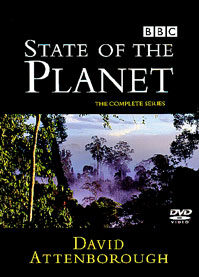
Sir David Frederick Attenborough is a British broadcaster, biologist, natural historian and author. He is best known for writing and presenting, in conjunction with the BBC Natural History Unit, the nine natural history documentary series forming the Life collection, a comprehensive survey of animal and plant life on Earth.

The Blue Planet is a British nature documentary series created and produced by the BBC. It premiered on 12 September 2001 in the United Kingdom. It is narrated by David Attenborough.

The Life of Mammals is a nature documentary series written and presented by David Attenborough, first transmitted in the United Kingdom from 20 November 2002.

A nature documentary or wildlife documentary is a genre of documentary film or series about animals, plants, or other non-human living creatures, usually concentrating on video taken in their natural habitat but also often including footage of trained and captive animals. Sometimes they are about wildlife or ecosystems in relationship to human beings. Such programmes are most frequently made for television, particularly for public broadcasting channels, but some are also made for the cinema medium. The proliferation of this genre occurred almost simultaneously alongside the production of similar television series.

Planet Earth is a 2006 British television series produced by the BBC Natural History Unit. Five years in the making, it was the most expensive nature documentary series ever commissioned by the BBC and also the first to be filmed in high definition. The series received multiple awards, including four Emmy Awards, a Peabody Award, and an award from the Royal Television Society.

Neil Nightingale is a freelance wildlife filmmaker, executive producer and creative consultant with over 35 years experience at the BBC. From 2009 to 2018 he was the creative director of BBC Earth, BBC Worldwide's global brand for all BBC nature and science content.

Are We Changing Planet Earth? and Can We Save Planet Earth? are two programmes that form a documentary about global warming, presented by David Attenborough. They were first broadcast in the United Kingdom on 24 May and 1 June 2006 respectively.

Saving THE Planet is a season of nature documentaries with a conservation theme, screened on BBC Television in 2007 to mark the 50th anniversary of its specialist factual department, the BBC Natural History Unit.

Frozen Planet is a 2011 British nature documentary series, co-produced by the BBC and The Open University. It was filmed by the BBC Natural History Unit. The production team, which includes executive producer Alastair Fothergill and series producer Vanessa Berlowitz, were previously responsible for the award-winning series The Blue Planet (2001) and Planet Earth (2006), and Frozen Planet is billed as a sequel of sorts. David Attenborough returns as narrator. It is distributed under licence by the BBC in other countries, Discovery Channel for North America, ZDF for Germany, Antena 3 for Spain and Skai TV for Greece.

Life is a British nature documentary series created and produced by the BBC in association with The Open University. It was first broadcast as part of the BBC's Darwin Season on BBC One and BBC HD from October to December 2009. The series takes a global view of the specialised strategies and extreme behaviour that living things have developed in order to survive; what Charles Darwin termed "the struggle for existence". Four years in the making, the series was shot entirely in high definition.
The following is a chronological list of television series and individual programmes where Sir David Attenborough is credited as writer, presenter, narrator, producer or interviewee. In a career spanning eight decades, Attenborough's name has become synonymous with the natural history programmes produced by the BBC Natural History Unit.
Attenborough: 60 Years in the Wild is a three-part BBC documentary series chronicling the 60 years career making wildlife programmes of Sir David Attenborough. The first hour-long programme, titled "Life on Camera" was broadcast on Friday 16 November 2012 on BBC Two at 9pm. The second part, "Understanding the Natural World" and third and final part, "Our Fragile Planet" were broadcast on following Fridays, 23 and 30 November 2012.

Planet Earth II is a 2016 British nature documentary series produced by the BBC as a sequel to Planet Earth, which was broadcast in 2006. The series is presented and narrated by Sir David Attenborough with the main theme music composed by Hans Zimmer.
Planet Earth is a television and film documentary franchise produced and broadcast by the BBC. The franchise began in 2001 with the success of The Blue Planet. As of 2017, The Blue Planet has spawned 5 series and one feature film.

Blue Planet II is a 2017 British nature documentary series on marine life produced by the BBC Natural History Unit. Like its predecessor, The Blue Planet (2001), it is narrated and presented by naturalist Sir David Attenborough.

Our Planet is a British nature documentary series made for Netflix. The series is narrated by David Attenborough and produced by Silverback Films, led by Alastair Fothergill and Keith Scholey, who also created BBC documentary series Planet Earth, Frozen Planet and The Blue Planet, in collaboration with the conservation charity World Wildlife Fund (WWF). The soundtrack was composed by composer Steven Price.

Seven Worlds, One Planet is a documentary series from the BBC Natural History Unit. The seven-part series, in which each episode focuses on one continent, debuted on 27 October 2019 and is narrated and presented by naturalist Sir David Attenborough. Over 1,500 people worked on the series, which was filmed over 1,794 days, with 92 shoots across 41 countries.

A Perfect Planet is a 2021 five-part earth science series presented by David Attenborough. The first episode premiered on 3 January 2021 on BBC One. Filming took place over four years, across 31 countries, with crew navigating difficulties in extreme temperatures and remote locations. The editing process was affected by the COVID-19 pandemic. The series covers volcanoes, the sun, weather and oceans, with the final episode focusing on human impact on the environment. It received positive critical reception.

The Green Planet is a 2022 nature documentary series on plants and their relationship with animals, humans and the environment. It was produced by BBC Studios Natural History Unit and narrated and presented by David Attenborough.
















